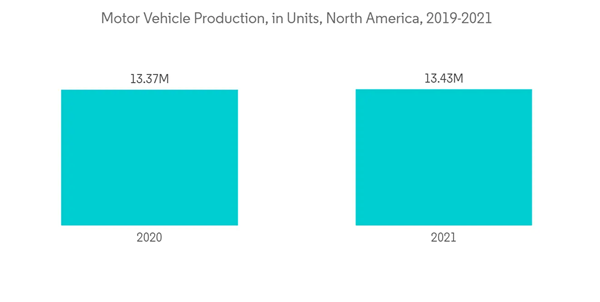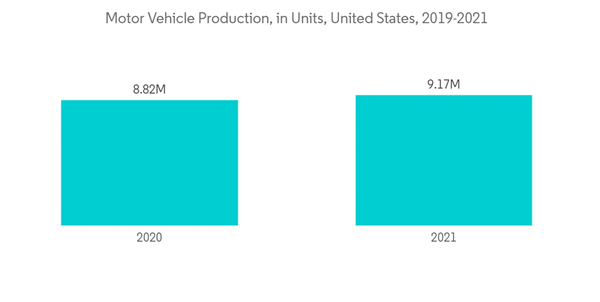COVID-19 harmed the North American bioethanol market. During COVID-19, automobile usage declined, and several production sites and distribution networks were hampered due to the lockdown, limiting bioethanol consumption within the region. After 2020, the market improved steadily due to the continuous activities in the North American area.
Key Highlights
- Rising demand for biofuels due to growing environmental concerns about the use of fossil fuels, increasing favorable initiatives, and blending mandates by regulatory bodies are expected to drive the bio-ethanol market's growth in North America.
- However, phasing out of fuel-based vehicles due to rising demand for electric cars is the primary factor hindering the market's growth.
- Developing second-generation bio-ethanol production and increasing consumption of Biofuels in the Aviation Industry is likely to be an opportunity in the future.
- United States is expected to dominate the bio-ethanol market in North America and is also likely to witness the highest CAGR during the forecast period.
North America Bio-ethanol Market Trends
Automotive and Transportation Segment to Dominate the Market
- Bioethanol is primarily used as a fuel-blending additive in the automotive and transportation segment. Bioethanol is a cost-effective and environmentally sustainable alternative to petroleum and gasoline-fueled road vehicles.
- Furthermore, North America holds a considerable market share, with leading countries like the United States, Canada, and Mexico driving the domestic demand for bioethanol to new heights in the automotive sector.
- Bioethanol is also utilized as a raw material in ETBE (ethyl-tertiary-butyl-ether) production, a well-known octane booster used along with gasoline.
- According to the Organisation Internationale des Constructeurs d'Automobiles (OICA), North America produced more than 13 million vehicles in 2021 and 2020, indicating bullish trends in the North American automotive industry growth, which is expected to impact the demand for the studied market positively.
- In November 2022, the Minister of Natural Resources Canada announced USD 800 Million in funding to support the Clean Fuels Sector within the country. This Initiative will support cellulosic ethanol production within the country.
- However, the rising electric vehicle adoption across the North American region may decrease bioethanol consumption in the future. For instance, in September 2022, the American government announced the USD 900 million approval to build EV chargers across the country during the North American International Auto Show. The studied market is expected to decline the examined market.
- Therefore, all the above factors are expected to affect the bioethanol market demand in the automotive and transportation industry soon.
The United States is Expected to Hold Significant Market Share
- The United States is one of the world's largest and most influential economies. It is expected to dominate the market for bioethanol in North America during the forecast period, owing to the demand from major end-user industries such as automotive and transportation, pharmaceuticals, and others.
- According to Pharmaceutical Research and Manufacturers of America, domestic revenue from the pharmaceutical industry in the United States was around USD 334 billion in 2021, slightly increasing to around USD 307 billion in 2020. Additionally, bioethanol includes many medical uses and can be present in products such as medical wipes and as an antiseptic in most antibacterial hand sanitizer gels.
- According to the Organisation Internationale des Constructeurs d'Automobiles (OICA), the United States produced around 9.17 million units of vehicles in 2021, witnessing a growth rate of 4% compared to the previous year. This trend is expected to support the studied market.
- According to the International Energy Agency (IEA), the United States produced 56.8 billion l of bioethanol in 2021, showing an increase of around 8.5% from 2020. This production capacity is estimated to reach about 57.5 billion l in 2022.
- The presence of significant cosmetics brands in the United States, including L'Oréal, New Avon, Coty, Estee Lauder, Revlon, and others, is likely to benefit the industry growth in the country, propelling the bio-ethanol market. In May 2021, L'Oréal USA announced an investment of more than USD 12 million to expand its North Little Rock plant. The acquisition will likely promote the plant's evolution toward becoming the global Color Cosmetics Center of Excellence within the L'Oréal Group.
- All factors above will likely fuel the bioethanol market growth in the United States over the forecast period.
North America Bio-ethanol Market Competitor Analysis
The North America Bio-ethanol market is moderately fragmented. Some of the major players in the market (not in any particular order) include ADM, Suncor Energy Inc., POET, LLC., Valero, and Cenovus Inc., among others.Additional benefits of purchasing the report:
- The market estimate (ME) sheet in Excel format
- 3 months of analyst support
This product will be delivered within 2 business days.
Table of Contents
1 INTRODUCTION1.1 Study Assumptions and Market Definition
1.2 Scope of the Study
2 RESEARCH METHODOLOGY
3 EXECUTIVE SUMMARY
4 MARKET DYNAMICS
4.1 Market Drivers
4.1.1 Increasing Favorable Initiatives and Blending Mandates by Regulatory Bodies
4.1.2 Rising Environmental Concerns by the Use of Fossil Fuels and Need for the Bio-fuels
4.2 Market Restraints
4.2.1 Phasing out of Fuel-based Vehicles Due to Rising Demand for Electric Vehicles
4.2.2 Shifting Focus to Bio-butanol
4.3 Industry Value Chain Analysis
4.4 Porter's Five Forces Analysis
4.4.1 Bargaining Power of Suppliers
4.4.2 Bargaining Power of Buyers
4.4.3 Threat of New Entrants
4.4.4 Threat of Substitute Products and Services
4.4.5 Degree of Competition
5 MARKET SEGMENTATION (Market Size in Volume)
5.1 Feedstock Type
5.1.1 Sugarcane
5.1.2 Corn
5.1.3 Wheat
5.1.4 Other Feedstocks
5.2 Application
5.2.1 Automotive and Transportation
5.2.2 Food and Beverage
5.2.3 Pharmaceutical
5.2.4 Cosmetics and Personal Care
5.2.5 Other Applications
5.3 Geography
5.3.1 United States
5.3.2 Canada
5.3.3 Mexico
6 COMPETITIVE LANDSCAPE
6.1 Mergers and Acquisitions, Joint Ventures, Collaborations, and Agreements
6.2 Market Share (%)**/Ranking Analysis
6.3 Strategies Adopted by Leading Players
6.4 Company Profiles
6.4.1 Abengoa
6.4.2 ADM
6.4.3 Alto Ingredients Inc
6.4.4 Blue Bio Fuels, Inc.
6.4.5 Cenovus Inc.
6.4.6 Cristalco
6.4.7 Cropenergies AG
6.4.8 Ethanol Technologies
6.4.9 Granbio Investimentos SA
6.4.10 Green Plains Inc
6.4.11 Henan Tianguan Group Co. Ltd
6.4.12 Jilin Fuel Ethanol Co. Ltd
6.4.13 KWST
6.4.14 Lantmannen
6.4.15 Poet LLC
6.4.16 Raizen
6.4.17 Sekab
6.4.18 Suncor Energy Inc.
6.4.19 Valero
6.4.20 Verbio Vereinigte Bioenergie AG
7 MARKET OPPORTUNITIES AND FUTURE TRENDS
7.1 Development of Second-generation Bio-ethanol Production
7.2 Increasing Consumption of Bio-fuels in the Aviation Industry
Companies Mentioned (Partial List)
A selection of companies mentioned in this report includes, but is not limited to:
- Abengoa
- ADM
- Alto Ingredients Inc
- Blue Bio Fuels, Inc.
- Cenovus Inc.
- Cristalco
- Cropenergies AG
- Ethanol Technologies
- Granbio Investimentos SA
- Green Plains Inc
- Henan Tianguan Group Co. Ltd
- Jilin Fuel Ethanol Co. Ltd
- KWST
- Lantmannen
- Poet LLC
- Raizen
- Sekab
- Suncor Energy Inc.
- Valero
- Verbio Vereinigte Bioenergie AG










